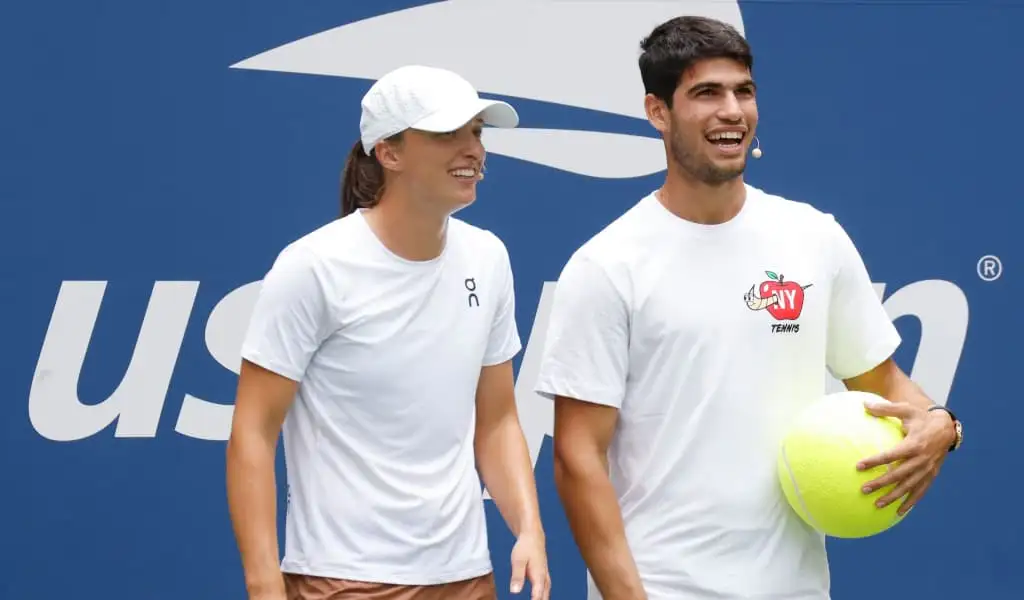
In a bold move that has sent ripples through the tennis world, Carlos Alcaraz and Iga Swiatek have publicly addressed their involvement in a collective effort to demand increased prize money from the four Grand Slam tournaments. The two young superstars, joined by an elite group of top-ranked players including Novak Djokovic, Jannik Sinner, Aryna Sabalenka, and Coco Gauff, co-signed a letter sent on March 21, 2025, urging the Australian Open, Roland Garros, Wimbledon, and the US Open to redistribute a greater share of their substantial profits to players. This unprecedented push, backed by nearly all top-10 ATP and WTA players, underscores a growing call for equity in a sport where financial rewards often lag behind its global prestige.
Alcaraz, fresh off his victory at the 2025 Monte-Carlo Masters, spoke candidly about the initiative after defeating Lorenzo Musetti in the final. When asked by reporters whether tennis is a well-paid sport, the 21-year-old Spaniard, who has earned over $38.8 million in career prize money, acknowledged the sport’s financial rewards but emphasized room for improvement. “Tennis is a well-paid sport, but it can always be improved because there is a percentage that can be increased for the circuit and the players,” Alcaraz said. His comments reflect a nuanced perspective: while top players like himself command significant earnings—bolstered by endorsements with brands like Nike, Rolex, and BMW—the broader player pool, especially those ranked outside the elite, often struggle to cover travel and coaching costs.
Swiatek, the world No. 2 and a five-time Grand Slam champion, echoed Alcaraz’s sentiments while preparing for the Porsche Tennis Grand Prix in Stuttgart, where she’s a two-time champion. Addressing the press ahead of her clay-court campaign, the 23-year-old Pole was measured but firm in her stance. “For sure we’ve been discussing with Grand Slams about many topics. Yeah, I mean, it could be better, but I’m not going to say a lot because, first of all, we need to figure it out kind of internally,” Swiatek said. Her restraint hints at the delicate negotiations underway, as players seek to balance public advocacy with behind-the-scenes diplomacy. With $35.2 million in career earnings, Swiatek’s push for change is driven not by personal gain but by a desire to uplift the sport’s ecosystem.
The letter, endorsed by the ATP and WTA Players’ Boards, represents a unified front. Notably, only Elena Rybakina among the top-10 women did not sign, while men’s stars like Alexander Zverev, Taylor Fritz, and Casper Ruud joined the cause. The Professional Tennis Players Association (PTPA), co-founded by Djokovic, has amplified the effort, building on its recent legal actions against the ATP, WTA, and ITIA for alleged anticompetitive practices. Djokovic himself emphasized the need for players to have a seat at the table. “Hopefully the Grand Slams will respond positively and want to have the players in the room and sit down and talk about the revenue shares,” he told reporters at the Monte Carlo Masters, highlighting the broader goal of involving players in decisions like rule changes that impact their livelihoods.
The timing of this initiative is significant. Grand Slams generate massive revenues—hundreds of millions annually from tickets, sponsorships, and broadcasting rights—yet players receive a smaller percentage of profits compared to other major sports. For instance, the 2025 Australian Open increased its purse by 11%, but its winner’s prize of approximately $2 million pales against the tournament’s overall earnings. Zheng Qinwen, a signatory, underscored the broader impact: “I think that that’s going to be more beneficial for all the players, not only the top players, especially for those players that work hard during all the years and need to get paid from the Slams.” Her words highlight the disparity between top earners and lower-ranked players, who often exit early rounds with modest payouts—like $30,050 for a first-round loss at Indian Wells 2024.
This isn’t the first time players have raised the issue. A similar letter was sent in 2012, but
Leave a Reply